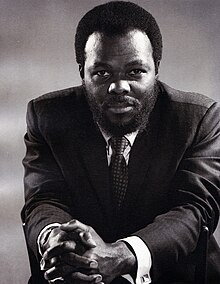Roy Innis
| Roy Innis | |
|---|---|

Roy Innis, circa 1970
|
|
| 4th National director of the Congress of Racial Equality | |
|
In office 1968 – January 8, 2017 |
|
| Preceded by | Wilfred Ussery |
| Succeeded by | TBD |
| Personal details | |
| Born |
Roy Emile Alfredo Innis June 6, 1934 Saint Croix, U.S. Virgin Islands |
| Died | January 8, 2017 (aged 82) New York City, New York, U.S. |
| Cause of death | Parkinson's disease |
| Political party |
Libertarian (1998–death) Democratic (1986–1998) |
| Children | Roy Innis, Jr. (deceased), Alexander Innis (deceased) Lydia Innis, Cedric Innis, Patricia Innis, Corinne Innis, Kwame Innis, Niger Innis, Kimathi Innis, Mugabe Innis |
| Occupation | Activist and politician |
Roy Emile Alfredo Innis (June 6, 1934 – January 8, 2017) was an American activist and politician. He had been National Chairman of the Congress of Racial Equality (CORE) since his election to the position in 1968.
One of his sons, Niger Roy Innis, serves as National Spokesman of the Congress of Racial Equality.
Innis was born in Saint Croix, U.S. Virgin Islands in 1934. In 1947, Innis moved with his mother from the U.S. Virgin Islands to New York City, where he graduated from Stuyvesant High School in 1952. At age 16, Innis joined the U.S. Army, and at age 18 he received an honorable discharge. He entered a four-year program in chemistry at the City College of New York. He subsequently held positions as a research chemist at Vick Chemical Company and Montefiore Hospital.
Innis joined CORE’s Harlem chapter in 1963. In 1964 he was elected Chairman of the chapter’s education committee and advocated community-controlled education and black empowerment. In 1965, he was elected Chairman of Harlem CORE, after which he campaigned for the establishment of an independent Board of Education for Harlem.
In the spring of 1967, Innis was appointed the first resident fellow at the Metropolitan Applied Research Center (MARC), headed by Dr. Kenneth Clark. In the summer of 1967, he was elected Second National Vice-Chairman of CORE.
Innis was elected National Chairman of CORE in 1968. Innis initially headed the organization in a strong campaign of Black Nationalism. White CORE activists, according to James Peck, were removed from CORE in 1965, as part of a purge of whites from the movement then under the control of Innis. Under Innis' leadership, CORE supported the presidential candidacy of Richard Nixon in 1968 and 1972. This was the beginning of a sharp rightward turn in the organization.
...
Wikipedia
